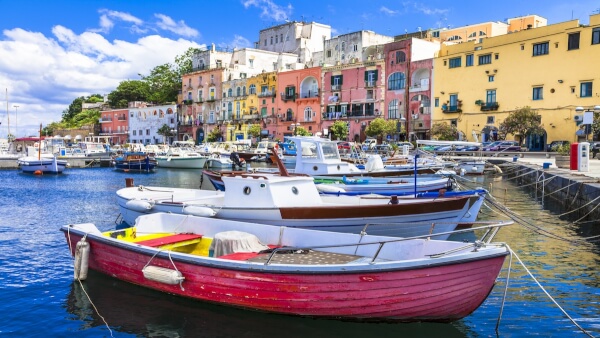What are some of the easiest countries to immigrate to?
Looking to move abroad? Check this guide on the easiest countries to migrate to.

Known as the Land of Fire and Ice, Iceland is a big draw for many Americans looking to live, study, and work in a completely different environment. Iceland has a progressive society, some awe-inspiring scenery, and a vibrant culture, which makes it a great fit for people looking for a new adventure.
This guide covers everything you need to know about moving to Iceland from the US, including your visa options, cost of living, Icelandic society culture, and more. While it's possible to move to Iceland as an American, there are also important pros and cons to consider.
We'll also introduce Wise — your international money transfer alternative. Use Wise to send stress-free transfers to over 140 countries - all at the standard mid-market exchange rate.
| Table of contents |
|---|
Iceland sits in the North Atlantic, roughly halfway between North America and mainland Europe. As an island nation, most consumer goods are imported, which affects pricing and availability. For example, it can be hard to find fresh fruits and vegetables in the winter.
The official language is Icelandic, but nearly all Icelanders speak excellent English.
| Capital | Reykjavík |
|---|---|
| Language | Icelandic (but English is widely spoken) |
| Population | 399,416¹ |
| Currency | Icelandic króna (ISK) |
| Government type | Parliamentary republic |
| Religion | Majority Christian, with some local traditional faiths also practiced |
| Weather | Possibly milder than you may expect — average winter temperatures of 32°F; summer can be 50-55°F |
| Tax treaty | Yes² |
Citizens from EU, EEA (European Economic Area), or EFTA (European Free Trade Association) countries can work in Iceland without special permits. They have up to 3 months to find employment before registering (extendable to 6 months for job seekers).³
However, Americans face more complex requirements for residency in Iceland. However, it's still possible to move to Iceland long-term.
Yes, Americans can move to Iceland through work, study, or marriage to an Icelandic citizen.
Iceland isn't the most popular destination for American expats, but it can be a perfect match for certain types of people. If you love outdoor adventures, don't mind small communities, and can handle seasonal changes, Iceland is an extremely safe place to live with a good work-life balance.
However, you should know what you're getting into before making the move:
- The weather can be mentally and physically challenging, and you might experience Seasonal Affective Disorder during the dark winter months
- Many jobs require Icelandic language skills, even though most Icelanders speak fluent English
- The rental market is extremely competitive, especially in Reykjavik, and securing affordable housing can be tough
- The cost of living in Iceland is about 47% higher than in the US, excluding rent⁴
Before committing to a permanent move, it's a good idea to visit Iceland for a few months during different seasons. This helps you understand daily life and build local connections, which will be valuable for finding housing or job hunting.
Americans can stay in Iceland for up to 90 days without a visa, which gives you plenty of time to test things out.⁵
If you want to stay in Iceland permanently, you'll need the right visa. Here are your main options:
Iceland has several nationally-accredited universities with programs for foreign students, and there's no central admissions system, so you apply directly to each university. Once you're accepted, you can apply for a student visa and enter Iceland.
Student visas only last as long as your enrollment. If you graduate or change schools, you need to apply for a new visa to stay in Iceland.
Getting a work visa in Iceland isn't easy, but it's not impossible. To qualify, you typically need to prove you have unique skills and experience that can't be found in Iceland's local workforce.
Your best chances come from working in high-demand fields like healthcare, construction, technology, or tourism.
Marriage to an Icelandic citizen is one of the easiest ways Americans can qualify for long-term residency. You'll simply need to prove that your relationship is genuine and submit all of the required paperwork. Eventually, you can get Icelandic citizenship, too.
Iceland offers a special visa for remote workers who aren't EU citizens. This visa lets you stay in Iceland for 90 to 180 days to work remotely, but you can't work for local Icelandic employers or participate in the local job market in any way.
To qualify, you need to show a monthly income of at least 1,000,000 ISK (about 8,250 USD) per month, or 1,300,000 ISK (about 10,730 USD) if you're bringing a spouse. You must work for a foreign company or be self-employed.
After living legally in Iceland for 4 years, you might be eligible to apply for a permanent residency permit. Citizenship typically requires at least 7 years of residence, though marriage to an Icelandic citizen can sometimes speed up the process.³⁷
Iceland is an expensive place to live, but wages are among the highest in Europe, too.
If you're just 1 person, you can expect your monthly costs to be around 1,593 USD excluding rent. For a family of 4, you'll need an average of 5,972 USD, plus rent.⁴
So, if you're coming to Iceland through an employment contract, make sure to take the high cost of living into consideration when negotiating your salary.
Here's a breakdown of a few essential living expenses:
| Expense | Approximate cost (USD)⁴ |
|---|---|
| Meal at an inexpensive restaurant | 27 USD |
| Meal for 2 people at a mid-range restaurant | 132 USD |
| Apartment (1 bedroom) in the city centre | 2,276 USD |
| Apartment (3 bedrooms) in the city centre | 3,273 USD |
| Basic utilities | 85 USD |
| Internet | 87 USD |
| Phone plan | 31 USD |
| International school (yearly for 1 child) | 30,993 USD |
| Toyota Corolla Sedan (or similar new car) | 54,824 USD |
You might need a bigger car, like an SUV or truck, because of harsh winters, and even basic sedans are expensive due to import taxes. So, that's something to consider.
Public schools in Iceland are free, but the primary language of education is Icelandic. Although many kids speak English fluently, if your children don't speak Icelandic, you might need to consider an international school, which will add significantly to your expenses.
Overall, making the move from the US will require you to adjust your budget because:⁸
- The cost of living in Iceland is 47.5% higher than in the US (excluding rent)
- The cost of living in Iceland is 39.3% higher than in the US (including rent)
- Housing prices are 22.4% higher in Iceland than in the US
- Restaurants and groceries are 52% and 47% higher (respectively) than in the US
At the same time, the local purchasing power in Iceland is 22% lower than in the US, despite the relatively high wages.⁸
But even with higher living costs, many Americans who make the move enjoy the local culture and don't want to leave Iceland. Your budget will demand careful planning, but qualified professionals can make it work, especially with a signed work contract.
If you have the right documents, opening a bank account in Iceland is pretty straightforward. You'll typically need:
- Valid passport
- Proof of address in Iceland
- Your Icelandic ID number (kennitala)
If you're working, bring your employment contract or proof of income, too. You can often start the application process online, but you'll likely need to visit a branch in person to complete the account opening.
The major banks in Iceland include Landsbankinn, Arion Bank, and Íslandsbanki. Since English is spoken fluently in the country, you should have no trouble communicating with bank representatives.
Having a local bank account makes daily life much easier for paying rent, utilities, and receiving your salary if you're working.
| 💡 Learn more about the different payment methods in Iceland. |
|---|
Most people in Iceland live in Reykjavik, which is where most job opportunities are. Smaller cities may be cheaper, but life there can be more challenging, especially if you're seeking employment.
Most Icelanders (80%, to be exact) own their homes, which leads to a smaller rental market.⁷ This means you won't have as much choice as you might expect when looking for rental properties, and you should also act fast when a good rental becomes available.
It's common for rental properties to be advertised in classified ads in local newspapers, but you can also try these websites:
- Housing Anywhere
- Properstar
- Airbnb
Facebook groups, such as Leiga, can also be helpful.
If you're attending an Icelandic university, they may have student housing or be able to help out with finding more affordable apartments or houses.
Iceland has a universal healthcare system that covers everyone for emergency care.
If you become a legal resident, you'll be covered by Icelandic Health Insurance (IHI) after living in the country for 6 months.⁹
The country divides healthcare into 7 districts, each with healthcare centers that provide general medical services. These centers offer primary care, lab tests, medical treatment, hospital nursing, rehabilitation services, elderly care, dentistry, and patient consultations.⁹
There's a co-payment system.
Once you reach a certain spending limit, your monthly costs drop significantly. The system covers payments for healthcare centers, hospitals, and services from private doctors, physiotherapists, occupational therapists, speech therapists, and psychologists.
Annual spending limits before reduced payments kick in:¹⁰
- Adults: 35,824 ISK (295 USD)
- Elderly, disabled, and those receiving rehabilitation pensions: 23,884 ISK (197 USD)
- Children ages 2-18: 23,884 ISK (197 USD)
- Children under 2: Free
All children in the same family count as one child for payment purposes.
Monthly payments after reaching the spending limit:¹⁰
- Adults: 5,971 ISK (49 USD)
- Elderly, disabled, and rehabilitation pension recipients: 3,981 ISK (33 USD)
- Children under 18: 3,981 ISK (33 USD)
If you don't use healthcare services in the following months, the monthly fee accumulates and gets added to your next payment when you do need care.
Overall, healthcare in Iceland is pretty accessible and affordable, even when you're a foreigner.
The capital of Iceland is home to around half of the country's residents. Reykjavik is colorful, vibrant, and full of culture. Tourists arrive to enjoy the city and access the more rural areas beyond the city all year round, meaning it’s a cosmopolitan and fun place to be, regardless of the weather. Costs of living here are high, but it’s also where there are the most jobs to be found.
Known as the heart of Viking culture, Hafnarfjörður is the third-largest town in Iceland and another big tourist draw.
There are festivals year-round to welcome visitors from around the world, again creating a fun atmosphere and plenty of work for people in the tourism industry. You’ll be close to the capital too, making it easy to get a quick change of scene whenever you want it.
If you’re heading to Iceland to explore the great outdoors, this may be a good option. Outdoor activities on offer include skiing, bird watching, horseback riding, and fishing, while there’s also plenty going on for those who love their culture.
If you need any other reason to check out Akureyri, it’s also a great place to base yourself if you want to see the Northern Lights.
Iceland consistently ranks as one of the safest countries in the world. The crime rates are low, and violent crime is almost unheard of. The main safety concerns you'll encounter are petty crimes like pickpocketing, which can happen in tourist areas, just like anywhere else in the world.
The biggest safety challenges are usually weather-related, such as winter driving conditions, sudden weather changes, and getting lost in remote areas during outdoor activities.
But overall, the safety of Icelandic cities will be refreshing for most Americans.
Let’s close out with a quick summary of some of the advantages and disadvantages of moving to Iceland from the US.
| Pros | Cons |
|---|---|
| Safe country | High cost of living |
| Beautiful natural scenery and outdoor activities | Small rental market |
| Great education system | It can be hard to find jobs |
| Affordable high-quality healthcare | Long, dark winters |
| Clean environment | It’s hard to learn Icelandic |
| Completely different experience from living in the US |
Iceland is an appealing country for expats who want a completely out-of-this-world experience.
Life in Iceland is nothing like what you’ll be used to at home, from the climate and scenery to the festivals, culture, and food. It's perfect if you're looking for a genuine adventure and don't mind the challenges that come with living on a remote island in the North Atlantic.
| Wise can help you get a better deal on currency conversion. You can convert over 40 currencies at the standard mid-market exchange rate, and we'll show you the fees upfront so you know exactly how much you're paying. |
|---|
Get a Wise Account
in minutes 💰
Sources
Sources checked 09/29/2025
*Please see terms of use and product availability for your region or visit Wise fees and pricing for the most up to date pricing and fee information.
This publication is provided for general information purposes and does not constitute legal, tax or other professional advice from Wise Payments Limited or its subsidiaries and its affiliates, and it is not intended as a substitute for obtaining advice from a financial advisor or any other professional.
We make no representations, warranties or guarantees, whether expressed or implied, that the content in the publication is accurate, complete or up to date.

Looking to move abroad? Check this guide on the easiest countries to migrate to.

Everything you need to know about security deposits

Everything you need to know about international schools in Manila, Philippines.

Moving to Switzerland from the US? This guide covers all the essential information for relocating to Switzerland as an American, including tips and insights.

Moving to Germany from the US? This guide covers all the essential information for relocating to Germany as an American, including tips and insights.

Moving to Italy from the US? This guide covers all the essential information for relocating to Italy as an American, including tips and insights.